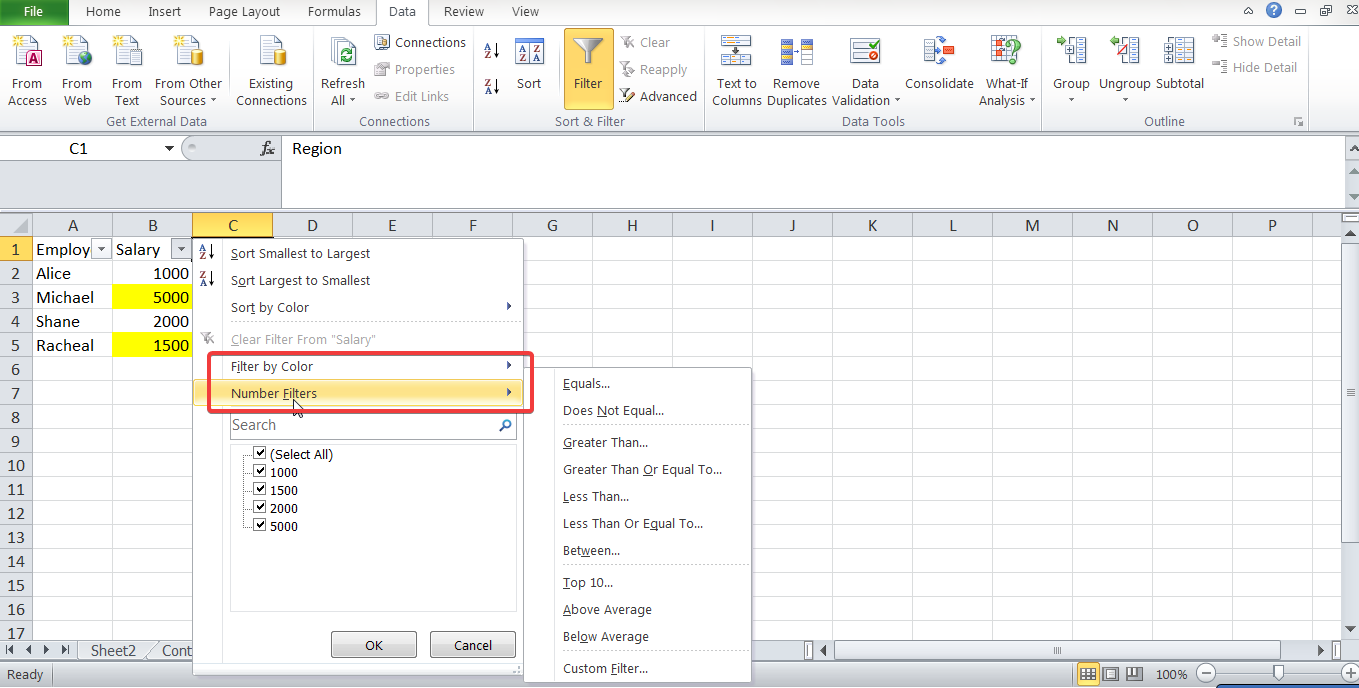We use basic AutoFilters in Excel on a daily basis to quickly sort and filter data. It helps in extracting specific information from a large dataset. However, Excel also offers Advanced Filters for complex filtering based on multiple conditions. Hence, it is important to know the difference between Advanced Filter and AutoFilter in Excel.
In this guide, we will discuss their distinct purposes and advantages which will help you understand when to use each. We will also give clear examples to build your comfort with advanced filters.
What is AutoFilter in Excel?
AutoFilter is the basic filter in Excel which we use commonly. It simply provides a drop-down menu having the unique values of a column so that you can easily sort or filter your data.
How to Apply AutoFilter:
-
Select the column where filter is needed.
-
Then, either go to Data tab and click on Filter or simply find the Sort & Filter icon on the home tab of ribbon and click on Filter.
A filter button will be applied at the top cell of the selected column.
Use Cases for AutoFilter:
-
We can filter records based on a single condition like cell value being greater than, less than a certain number etc.
- We can also run text based filtering like cells having certain text.
-
AutoFiler can sort data alphabetically or numerically in ascending or descending order.
-
We can filter based on cell color

Example 1: Filtering Sales Data Using AutoFilter
Let’s look at the following dataset:
| Region | Salesperson | Sales |
|---|---|---|
| East | Maria | 2000 |
| West | John | 1500 |
| East | Alice | 2500 |
| North | Maria | 1800 |
Goal: Only display records having the region “East”.
Steps:
-
Apply AutoFilter using the steps above and click the dropdown in the Region column.
-
Select only East.
-
Excel will display only the East region rows.
This is simple and quick!
What is Advanced Filter in Excel?
Advanced Filter is used for filtering based on complex criteria. For e.g., filtering AND/OR logic or filtering unique records.
How to Apply Advanced Filter:
-
Set up a criteria range above or beside your data.
-
Go to Data > Advanced.
-
Choose whether to filter in place or copy to another location.
-
Specify the list range and criteria range.
-
Click OK.
Example 2: Filter Data Where Region is “East” AND Sales > 2000
| Region | Salesperson | Sales |
|---|---|---|
| East | Maria | 2000 |
| West | John | 1500 |
| East | Alice | 2500 |
| North | Maria | 1800 |
Criteria Range Setup:
| Region | Sales |
|---|---|
| East | >2000 |
Steps:
-
Highlight your dataset (A1:C5).
-
Go to Data > Advanced.
-
Choose “Filter the list, in-place”.
-
For Criteria Range, select the two rows above.
-
Click OK.
Result: Only the row with Alice (East, 2500) appears.
AutoFilter vs Advanced Filter: Side-by-Side Comparison
| Feature | AutoFilter | Advanced Filter |
|---|---|---|
| Ease of Use | Very easy (1-click dropdown) | Requires setup of criteria range |
| Filter Multiple Columns | Yes | Yes |
| Complex Criteria (AND/OR) | No | Yes |
| Filter Unique Records | No | Yes (checkbox option) |
| Output Location | In-place only | In-place or copy to new range |
| Dynamic Update | Yes (auto refreshes) | No (needs reapplying after changes) |
Practice Questions on Advanced Filter and AutoFilter in Excel
Try these to solidify your learning:
-
Use AutoFilter to show only rows where Sales > 1800.
-
Create an Advanced Filter to display rows where:
-
Region = West OR Sales < 2000.
-
-
Use Advanced Filter to copy all unique Salesperson names to a new range.
Tips for Using Advanced Filter Effectively
-
Always include the exact same column headers in your criteria range.
-
Use formulas like
=AND(A2="East",C2>2000)for more advanced logic (array formulas). -
You can even filter on partial text using wildcards like
*,?.
Conclusion on Advanced Filter and AutoFilter in Excel
Both AutoFilter and Advanced Filter are valuable Excel tools, but they serve different purposes. AutoFilter is perfect for quick, simple filtering tasks. Advanced Filter, on the other hand, gives you more control with complex criteria, especially when you’re preparing reports or need unique values in a new location.
Once you’re comfortable with both, you’ll know exactly when to use each — and you’ll save hours of manual work!
Also read –
Working with Structured Tables in Excel: A Complete Guide
Using Named Ranges in Excel: Simplify Your Formulas
Waterfall, Pareto, and Funnel Charts in Excel: A Beginner’sGuide

2 thoughts on “Advanced Filter vs AutoFilter in Excel: What’s the Difference?”